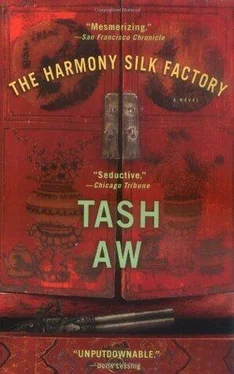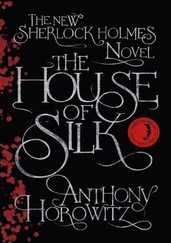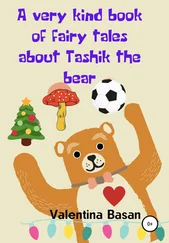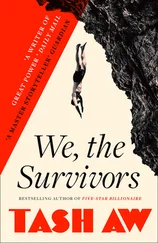Tash Aw
The Harmony Silk Factory
Clare Allan, Susan Ambler, James Arnold, Lil Aw, Richard Barltrop, Diana Evans, David Godwin, Philip Goff, Jennifer Kabat, Paul Magrs, Julian Pettifer, Iain Ross, Cindy Spiegel
THE HARMONY SILK FACTORY is the name of the shop house my father bought in 1942 as a front for his illegal businesses. To look at, the building is unremarkable. Built in the early thirties by itinerant Chinese coolies (of the type from whom I am most probably descended), it is the largest structure on the single street which runs through town. Behind its plain whitewashed front lies a vast, cave-dark room originally intended to accommodate light machinery and a few nameless sweatshop workers. The room is still lined with the teak cabinets my father installed when he first acquired the factory. These were designed to store and display bales of cloth, but as far as I can remember, they were never used for this purpose, and were instead stacked with boxes of ladies’ underwear from England which my father had stolen with the help of his contacts down at the docks. Much later, when he was a very famous and very rich man — the Elder Brother of this whole Valley — the cabinets were used to house his collection of antique weapons. The central piece in this display was a large kris, whose especially wavy blade announced its provenance: according to my father, it had belonged to Hang Jebat, the legendary warrior who, as we all know, fought against the Portuguese colonisers in the sixteenth century. Whenever Father related this story to visitors, his usually monotonous voice would assume a gravelly, almost theatrical seriousness, impressing them with the similarity between himself and Jebat, two great men battling against foreign oppressors. There were also Gurkha kukris with curved blades for speedy disembowelment, Japanese samurai swords, and jewel-handled daggers from Rajasthan. These were admired by all his guests.
For nearly forty years the Harmony Silk Factory was the most notorious establishment in the country, but now it stands empty and silent and dusty. Death erases all traces, all memories of lives that once existed, completely and forever. That is what Father sometimes told me. I think it was the only true thing he ever said.
WE LIVED IN A HOUSE separated from the factory by a small mossy courtyard which never got enough sunlight. Over time, as my father received more visitors, the house too became known as the Harmony Silk Factory, partly for convenience — the only people who came to the house were those who came on business — and partly because my father’s varied interests had extended into leisure and entertainment of a particular kind. Therefore it was more convenient for visitors to say, “I have to attend to some business at the Harmony Silk Factory,” or even, “I am visiting the Harmony Silk Factory.”
Our house was not the kind of place just anyone could visit. Indeed, entry was strictly by invitation, and only a privileged few passed through its doors. To be invited, you had to be like my father — that is to say, you had to be a liar, a cheat, a traitor, and a skirt-chaser. Of the very highest order.
From my upstairs window, I saw everything unfold. Without Father ever saying anything to me, I knew, more or less, what he was up to and whom he was with. It wasn’t difficult to tell. Mainly, he smuggled opium and heroin and Hennessy XO. These he sold on the black market down in Kuala Lumpur for many, many times what he had paid over the border to the Thai soldiers, whom he also bribed with American cigarettes and low-grade gemstones. Once, a Thai general came to our house. He wore a cheap grey shirt and his teeth were gold, real solid gold. He didn’t look much like a soldier, but he had a Mercedes-Benz with a woman in the back seat. She had fair skin, almost pure white, the colour of salt fields on the coast. She was smoking a kretek and in her hair she wore a white chrysanthemum.
Father told me to go upstairs. He said, “My friend the general is here.”
They locked themselves in Father’s Safe Room, and even though I lifted the lino and pressed my ear to the floorboards, I could hear nothing except the faint clinking of glasses and the low, muffled rumble which by then I knew to be the tipping of uncut diamonds onto the green baize table.
I waved at the woman in the car. She was young and beautiful, and when she smiled I saw that her teeth were small and brown. She was still smiling at me as the car pulled away, raising a cloud of dust and beeping at bicycles as it sped up the main street. It was rare in those early days to see expensive cars and big-town women in these parts, but if ever you saw them, they would be hanging around our house. None of our visitors ever noticed me, though, none but that woman with the fair skin and bad teeth.
I told Father about this woman and how she had smiled at me. His response was as I expected. He reached slowly for my ear and twisted it hard, squeezing the blood from it. He said, “Don’t tell stories,” and then slapped my face twice.
To tell the truth, I had become used to this kind of punishment.
Even when I was young, I was aware of what my father did. I wasn’t exactly proud, but I didn’t really care. Now I would give everything to be the son of a mere liar and cheat, because, as I have said, that wasn’t all he was. Of all the bad things he ever did, the worst happened long before the big cars, the pretty women, and the Harmony Silk Factory.
Now is a good time to tell his story. At long last, I have put my crime-funded education to good use, and have read every single article in every book, newspaper, and magazine that mentions my father, in order to understand the real story of what happened. For more than a few years of my useless life, I have devoted myself to this enterprise, sitting in libraries and government offices even. My diligence has been surprising. I will admit that I have never been a scholar, but recent times have shown that I am capable of rational, organised study, in spite of my father’s belief that I would always be a dreamer and a wastrel.
There is another reason I now feel particularly well placed to relate the truth of my father’s life. An observant reader may sense forthwith that it is because the revelation of this truth has, in some strange way, brought me a measure of calm. I am not ashamed to admit that I have searched for this all my life. Now, at last, I know the truth and I am no longer angry. In fact, I am at peace.
As far as it is possible, I have constructed a clear and complete picture of the events surrounding my father’s terrible past. I say “as far as it is possible” because we all know that the retelling of history can never be perfectly accurate, especially when the piecing together of the story has been done by a person with as modest an intellect as myself. But now, at last, I am ready to give you this, “The True Story of the Infamous Chinaman Called Johnny.”
2. The True Story of the Infamous Chinaman Called Johnny (Early Years)
SOME SAY JOHNNY WAS BORN IN 1920, the year of the riots in Taiping following a dispute between Hakkas and Hokkiens over the right to mine a newly discovered tin deposit near Slim River. We do not know who Johnny’s parents were. Most likely, they were labourers of Southern Chinese origin who had been transported to Malaya by the British in the late nineteenth century to work in the mines in the Valley. Such people were known to the British as coolies, which is generally believed to be a bastardisation of the word kulhi, the name of a tribe native to Gujerat in India.
Читать дальше
Конец ознакомительного отрывка
Купить книгу












